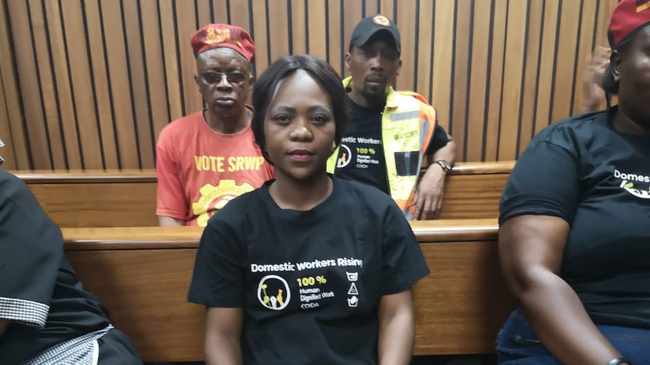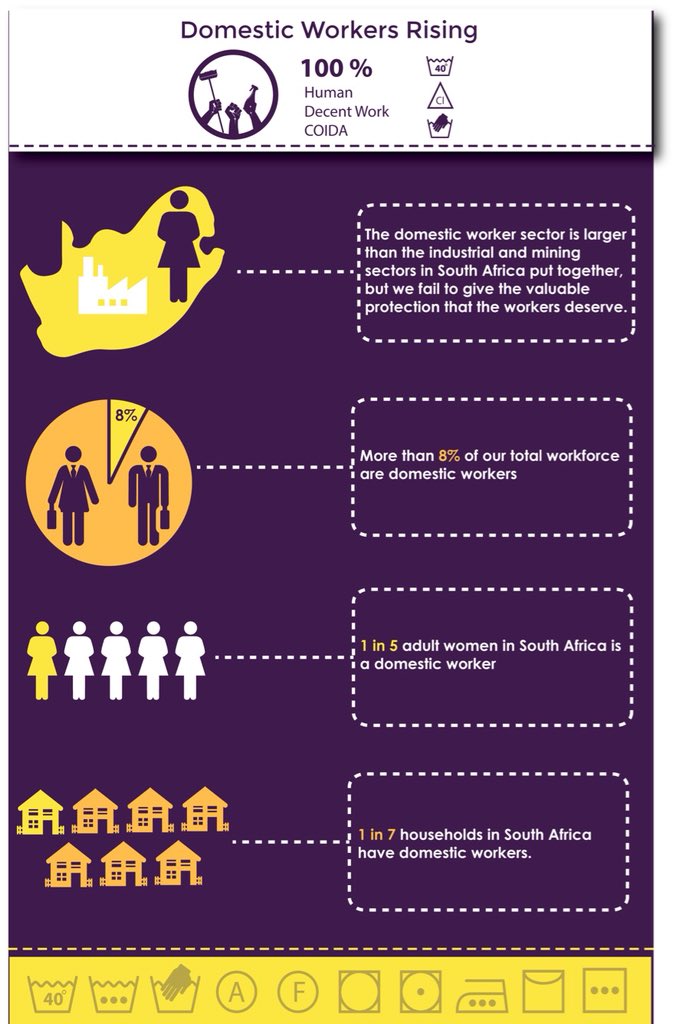
Sylvia Mahlangu, Maria Mahlangu’s daughter, in court
Great news from South Africa! Yesterday, October 17, 2019, the Gauteng High Court ruled that domestic workers injured on the job in the past can claim damages, under the Compensation for Occupational Injuries and Diseases Act, COIDA. This ruling includes the family of Maria Mahlangu, a domestic worker who had worked for the same family for twenty years. While washing windows, Maria Mahlangu slipped, fell into the pool, and drowned. Her family received no compensation. More the point, the family offered no compensation and the State, at that point, excluded domestic workers from COIDA. On May 23 of this year, the North Gauteng High Court ruled that that exclusion was unconstitutional, but they did not rule on those who had been injured prior to the ruling or in past jobs. Yesterday’s ruling clears all that up. The Court ruled that the Constitutional invalidity of the exclusion of domestic workers means that all domestic workers are due unlimited retrospective COIDA compensation. The case now goes to the Constitutional Court. Today, we must celebrate, support and give thanks to all those domestic workers and domestic worker organizers, past and present, who brought the Court to make a decision. They refused to bargain with the State, and said, simply and directly, “Our rights are non-negotiable.”
Founding member of the United Domestic Workers of South Africa (Udwosa), Pinky Mashiane, said, “This is a victory for us and we will now approach the Constitutional Court with confidence that it will also rule in our favour. Government had denied domestic workers their right for a long time as it discriminated against us. We will move forward with the confidence that those injured on duty and the families of those who had died, will at long last receive compensation.”
In July, Myrtle Witbooi, the President of the International Domestic Workers Federation and General Secretary of the South African Domestic Service and Allied Workers’ Union, explained, “The government ratified International Labour Organisation Convention 189 (dealing with the rights of domestic workers worldwide) in June 2013, which meant that they had a year to include domestic workers in COIDA. We had several campaigns, but all we got were promises. In 2016, the government told the ILO that COIDA would be extended to domestic workers, and it was gazetted in 2018. It is now 2019, and we are still waiting … While we have been fighting for domestics to be included in COIDA, many women have lost their lives or have been injured while on duty and have received no compensation at all.”
Pinky Mashiane and Myrtle Witbooi have called for expanded and deepened support for their campaign from all social justice sectors in South Africa. Hopefully, many will heed and respond to the call. At the same time, this is a case that crosses beyond the borders of South Africa and beyond the African continent. Many countries across the globe, including the United States, continue to exclude domestic workers from labor laws and from labor law protections and rights. That time is coming to an end. Domestic work is decent work, and domestic workers demand recognition, formal recognition, of the dignity of their labor. Tell your family, friends, colleagues and neighbors about Maria Mahlangu and about this week’s decision. Remind them that the struggle continues, and as it does, it expands the horizons. Amandla!
(Photo Credit: Zelda Venter / IOL)
